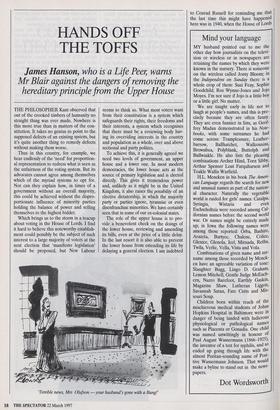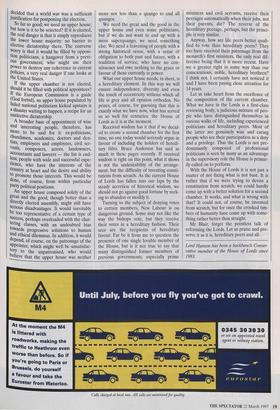HANDS OFF THE TOFFS
James Hanson, who is a Life Peer, warns
Mr Blair against the dangers of removing the hereditary principle from the Upper House
THE PHILOSOPHER Kant observed that out of the crooked timbers of humanity no straight thing was ever made. Nowhere is this more true than in matters of the con- stitution. It takes no genius to point to the supposed defects of an existing system, but it's quite another thing to remedy defects without making them worse.
Thus in this country, for example, we hear endlessly of the 'need' for proportion- al representation to redress what is seen as the unfairness of the voting system. But its advocates cannot agree among themselves which of the myriad systems to opt for. Nor can they explain how, in times of a government without an overall majority, this could be achieved without the dispro- portionate influence of minority parties holding the balance of power and selling themselves to the highest bidder.
Which brings us to the storm in a teacup about voting in the House of Lords. I find it hard to believe this noteworthy establish- ment could possibly be the subject of such interest to a large majority of voters at the next election that 'manifesto legislation' should be proposed, but New Labour seems to think so. What most voters want from their constitution is a system which safeguards their rights, their freedoms and their interests, a system which recognises that there must be a reviewing body hav- ing its overriding interests in the country and population as a whole, over and above sectional and party politics.
To achieve this, it is generally agreed we need two levels of government, an upper house and a lower one. In most modern democracies, the lower house acts as the source of primary legislation and is elected directly. This gives it tremendous power and, unlikely as it might be in the United Kingdom, it also raises the possibility of an elective dictatorship, in which the majority party or parties ignore, tyrannise or even disenfranchise minorities. We have certainly seen that in some of our ex-colonial states.
The role of the upper house is to pro- vide a benevolent check on the doings of the lower house, reviewing and amending its bills, even at the price of a little delay. In the last resort it is also able to prevent the lower house from extending its life by delaying a general election. I am indebted Terrible news, Mrs. Olufson — your husband's gone with a Bang!' to Conrad Russell for reminding me that the last time this might have happened here was in 1940, when the House of Lords decided that a world war was a sufficient justification for postponing the election. So far so good; we need an upper house; but how is it to be selected? If it is elected, the real danger is that it simply reproduces the lower house majority: no barrier to elective dictatorship there. The converse worry is that it would be filled by opposi- tion politicians, a hangover from a previ- ous government, who might use their Power to destroy any coherence in current policies, a very real danger if one looks at the United States.
If the upper chamber is not elected, should it be filled with political appointees? If the European Commission is a guide (God forbid), an upper house populated by failed national politicians kicked upstairs is a disaster waiting to happen, a recipe for an unelective dictatorship. A broader base of appointment of wise and interesting people, therefore, has more to be said for it: ex-politicians, churchmen, academics, doctors and den- tists, employers and employees, civil ser- vants, composers, actors, landowners, accountants and lawyers — the list is end- less; people with wide and successful expe- rience, who have the interests of the country at heart and the desire and ability to promote those interests. This would be done, of course, from within particular Party political positions. An upper house composed solely of the great and the good, though better than a directly elected assembly, might still have serious disadvantages. It would inevitably be too representative of a certain type of success, perhaps overloaded with the chat- tering classes, with an undoubted bias towards progressive solutions to human and ethical dilemmas. In addition, it would depend, of course, on the patronage of the aPPointer, which might well be unsatisfac- tory to the unpatronised, who would believe that the upper house was neither more nor less than a quango to end all quangos.
We need the great and the good in the upper house and even some politicians, but if we do not want to end up with a mere superquango, we need something else. We need a leavening of people with a strong historical sense, with a sense of obligation to both past and future, with a tradition of service, who have no con- stituency and owe nothing to the grace or favour of those currently in power.
What our upper house needs, in short, is a hereditary element. In this way we will . ensure independence, diversity and even the touch of eccentricity without which all life is grey and all opinion orthodox. No prizes, of course, for guessing that this is exactly what we have now, what has served us so well for centuries: the House of Lords as it is at the moment.
Received wisdom has it that if we decid- ed to create a second chamber for the first time, no one today would seriously argue in favour of including the holders of heredi- tary titles. Bruce Anderson has said as much in these pages recently. If received wisdom is right on this point, what it shows is not the undesirability of the arrange- ment, but the difficulty of inventing consti- tutions from scratch. As the current House of Lords has fallen into our laps by the steady accretion of historical wisdom, we should not go against good fortune by seek- ing to abandon or modify it.
Turning to the subject of denying votes to certain members, New Labour is on dangerous ground. Some may not like the way the bishops vote, but they receive their votes in a hereditary fashion. Their sees are the recipients of hereditary favour. Far be it from me to question the presence of one single lovable member of the House, but is it not true to say that many distinguished former members of previous governments, especially prime ministers and civil servants, receive their peerages automatically when their jobs, not their parents, die? The reverse of the hereditary peerage, perhaps, but the princi- ple is very similar.
Anyway, how are life peers better quali- fied to vote than hereditary peers? They too have received their patronage from the monarch's first ministers, the only real dif- ference being that it is more recent. Have we a greater right in some way than our conscientious, noble, hereditary brethren? I think not. I certainly have not noticed it and I have been paying close attention for 14 years.
Let us take heart from the excellence of the composition of the current chamber. What we have in the Lords is a first-class reviewing body, a judicious mixture of peo- ple who have distinguished themselves in various walks of life, including experienced politicians and hereditary peers. Most of the latter are genuinely wise and caring people who see their participation as a duty and a privilege. That the Lords is not pre- dominantly composed of professional politicians is seen by many as an advantage in the supervisory role the House is primar- ily called on to perform.
With the House of Lords it is not just a matter of not fixing what is not bust. It is rather that if we were trying to devise a constitution from scratch, we could hardly come up with a better solution for a second chamber. It works, and what is wrong with that? It could not, of course, be invented from scratch, but for once the crooked tim- bers of humanity have come up with some- thing rather better than straight.
Mr Blair, forget the pointless talk of reforming the Lords. Let us praise and pre- serve it as it is, hereditary peers and all.
Lord Hanson has been a backbench Conser- vative member of the House of Lords since 1983.



































































 Previous page
Previous page